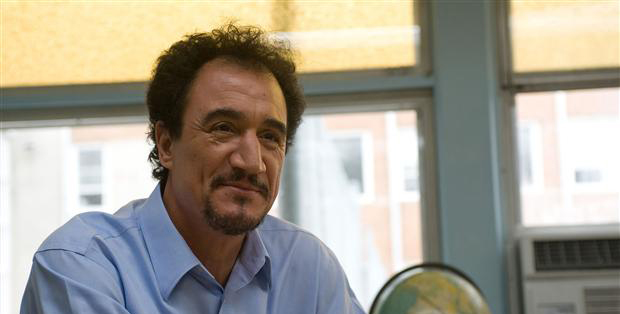Showing @ Filmhouse, Edinburgh until Thu 17 May
Philippe Falardeau / Canada / 2011 / 94 min
In the last decade, Philippe Falardeau has established himself within a long tradition of Québécois filmmaking interested in the appeal of francophone Canada. His mockumentary The Left-Hand Side of the Fridge (2000) is concerned with portraying everyday life in Montreal while Congorama (2006) explores the calling of the motherland. His current fixation with how this province can be disrupted sees him delve further into the human psyche in this affecting and often irksome drama, inspired by Évelyne de la Chenelière‘s one-character play.
A seemingly typical day at a Montreal elementary school is rocked by tragedy as one of the staff commits suicide in her classroom. Fortunately, a new “teacher”, Bachir Lazhar (Mohamed Saïd Fellag), arrives to help ease the crisis and begins educating (and counselling) the kids on poetry and diction. Soon however, his violent past catches up with him, jeopardising his position and threatening to drive him away.
Worryingly, Lazhar enters as a Patch Adams type figure: good-willed, ready to help the kids and leaning heavily towards cliché. But Fellag works with the character, a frail immigrant who’s struggling to overcome the death of his family at the hands of political terrorists in Algeria. It provides a well-engineered, albeit obvious, connection between his and the children’s search for closure and understanding. That said, this bond allows Falardeau to explore the effects of grief with a sense of maturity, developing an area already explored in his previous film: It’s Not Me, I Swear! (2008).
Falardeau captures this sense of tacit yet deep-seated kinship in the rapport between Bachir and pupil Alice (Sophie Nélisse); though it might seem like an obscure parallel, their relationship is akin to Mr. Bergstrom and Lisa’s in The Simpsons for anyone with a gifted memory. They share the same poetic expression to their grief, reflecting on the inexplicable nature of suicide and how its consequences are like a vacuum, spiralling into depths of our subconscious which even the most lyrical of poets cannot explain.
There’s no doubt that Falardeau owes the success of Monsieur Lazhar largely to Fellag, whose achingly affectionate and touching performance pierces through the solemnity of the plot, yet never wanders into insincerity. His warmth clashes against the literal wintry setting and iciness with which he’s received by most of his colleagues. In this sense, there is something profoundly haunting about Falardeau’s film; a heartbreaking tale of isolation caught up in anguish seems almost painfully elegant when delivered with such crisp, French dialogue. It’s where the true mastery lies: a gently orchestrated message of survival steeped in the honesty and innocence of a school classroom.
